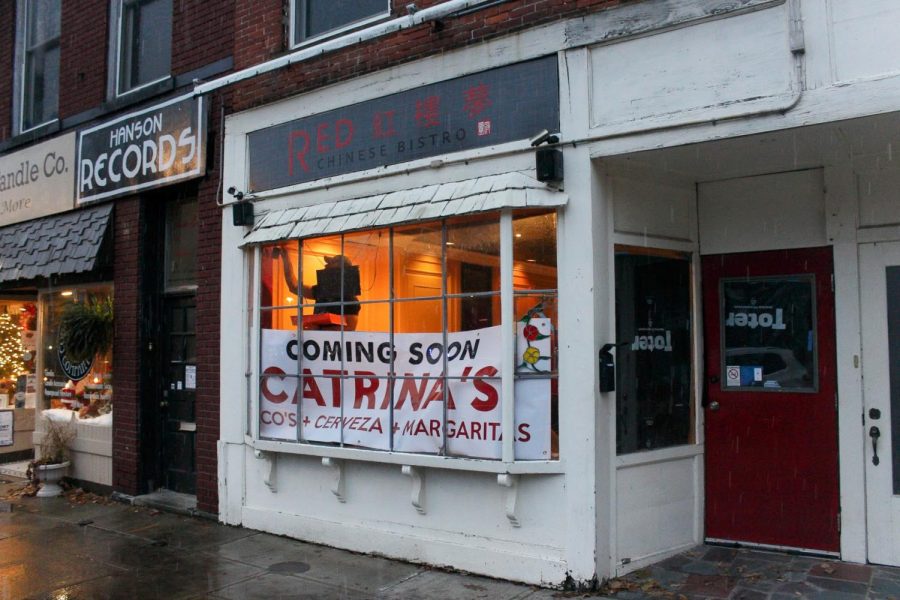City Continues to Grow, Community Weighs Benefits
Devin Cowan, Staff Photographer
Catrina’s, a new Oberlin restaurant, prepares to open on West College Street.
The city of Oberlin is welcoming a number of local businesses and restaurants in the coming months, including Oberlin Nutrition, a health drink and smoothie shop which will open on 175 South Main Street in late November; Catrina’s, a taco restaurant which will take the place of Red’s Chinese Bistro; and a Wendy’s fast food franchise set to open in the Oberlin Shopping Plaza in December at the intersection of U.S. Highway 20 and Ohio State Route 58. This is part of the city’s ongoing efforts to expand economic opportunities in Oberlin.
Existing businesses have also voiced plans to expand McDonald’s recently announced a remodel of its Oberlin location starting in March 2019 and existing empty spaces continue to find eager buyers looking to do business in the city.
This combination of new development projects and the expansion of existing businesses is at the core of the city’s development strategy.
“The city’s focus is to continue to work with the existing businesses to support their present and future needs,” City Manager Robert Hillard wrote in an email to the Review. “We further engage interested businesses that want to locate in Oberlin. We believe this balanced strategy will assure success in business retention and responsible growth.”
The city has also introduced a number of incentive programs to help local businesses, including tax abatements and financial assistance programs to encourage them to expand or move to Oberlin.
“The city has a number of approaches to assist in business development including tax abatement programs, utility efficiency consultation and financial assistance programs, and loan programs,” Hillard wrote. “We continue to develop outreach programs to listen to the needs of the community.”
While Wendy’s atypically reached out to the city about a possible expansion, the city government typically collaborates with local stakeholders such as the Oberlin Business Partnership and the Oberlin Community Improvement Corporation to attract outside businesses.
The OCIC is tasked with responsibly developing space in town and making decisions about selling lots to developers. When considering if a business addition would benefit the city, the corporation tries to take into account multiple factors including the potential for job creation and the city’s goal of carbon neutrality by 2050.
“The city right now has three surplus properties out in the industrial park area and they have charged [OCIC] with [managing the sale] of those,” Director of Planning and Development Carrie Handy said. “We’ve had people make offers here in the last year or so. OCIC had to take a look at those proposals, whether or not we wanted to sell those properties so there were two proposals and they chose not to [accept those bids], but we’re certainly having conversations about how to develop those properties.”
Cities like Oberlin have to weigh the benefits of attracting developments while also striving to preserve the character of the community.
“I think [the city is trying to attract] businesses that want to be part of a community where carbon neutrality is important,” Handy said. “We’ve had that discussion so OCIC is talking about that with [the surplus properties]; what type of businesses do we want here?”
Some community members feel the increasing number of chain restaurants and large corporations such as the Wendy’s, McDonald’s, and the Walmart, which opened in 2006, send a mixed message to consumers.
“[Oberlin] tells us to shop local, yet they have a Walmart, and they have CVS and all these big corporate restaurants ó McDonald’s and now Wendy’s,” said Black River Cafe Night Manager Sonny Berry. “I don’t know what they’re trying to go for at this point. Are we trying to be a tight-knit community with small business owners, or are we trying to shut down all the businesses letting all these corporations come in?”
Students have mixed feeling about the growing number of franchises in Oberlin.
“I love Wendy’s. I love their food. I think that Wendy’s is generally better than most other fast-food restaurants, but at the end of the day it’s still fast-food,” College senior Alex Scheitinger said. “I’ll probably eat there, but it would be cool if some other more locally-operated restaurants opened; some other not fast-food chain would be preferred.”
Restaurants are only one piece of the city’s future plans. The city will also review Oberlin’s Comprehensive Development Plan and welcomes input from residents.
“The City is scheduled to begin a review of the comprehensive plan after an administrative review of the Zoning Ordinance,” Hillard wrote. “Citizens, businesses and many other stakeholders will be invited to participate in the Comprehensive Plan process, and are considered critical to the development of the plan.”
In conjunction with the development projects, some groups have also focused on bringing more visitors to town by highlighting what makes Oberlin unique.
“Oberlin is the cultural Mecca of the county, it’s where culture happens,” said Oberlin Business Partnership Executive Director Janet Haar. “So why don’t we use that [to attract visitors and drive commerce]?”
Berry agrees and wishes that there were more opportunities for members of the community to take advantage of the city’s arts scene ó especially when it comes to music.
“I think they should focus more on music and art in this town. They have no street piano, no buskers,” he said. “It just kills me that [Oberlin] is such an expensive college to go to, and being somebody that lives here I can’t enjoy any of the music students because they don’t perform anywhere. Yes, they have recitals, but I work most of those recitals, so it would be nice if there was more of the busking.”





